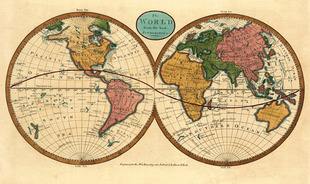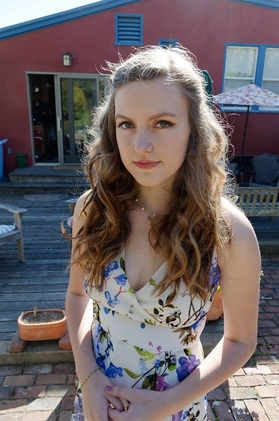
Tools needed to be successful at OSA, or even in Oakland, are shunned just a few cities over. In this way, growing up in one community allows for a bubble—a protective coating—to form, delivering the same opinions over and over to its children while simultaneously telling them they are being spoon-fed the whole story. --Molly Gardner

Most OSA students have lived in Oakland’s surrounding areas their entire lives, and though diverse in student body, there are certain values nearly every student at Oakland School for the Arts has. We are privileged, certainly, to be in an environment that fosters creativity and self-expression; in most areas of the country, the idea of an arts charter school is frivolous, laughable. It is safe to say, therefore, that Oakland’s subcommunities generally value art more than communities in say, rural Arizona. (I would know, I lived there.) Similarly, my own Bay Area upbringing was shattered the day I moved to Hawai’i, where it became clear that no fierce liberalism could replace a vocabulary that would grant me acceptance into my new community. I was still an outsider.
Our values are inextricably linked to where we come from, and help determine where we go from there. Even within the bounds of our home country, our morals and belief systems are challenged, and life experiences put to the test. Tools needed to be successful at OSA, or even in Oakland, are shunned just a few cities over. In this way, growing up in one community allows for a bubble—a protective coating—to form, delivering the same opinions over and over to its children while simultaneously telling them they are being spoon-fed the whole story.
This is not, however, the fault of OSA students, nor the infrastructure of any city. It simply comes with lack of exposure to other places and ideologies, which in turn, can also be a blessing. By growing up in one environment, the world is experienced in palatable amounts, ensuring children will come to know themselves in a stable environment before experiencing the disorientation of being uprooted into a new community.
Unraveling who we are is an enormous part of growing up--and to do so, we must peel apart the layers of where we come from. Krissy Jones, Saa’ra Shaheed, and Carson Earnest, all young women from various parts of the USA, are doing just that. Their values are products of the people and places they have known--and regardless of geography, they are linked by one mantra: we believe what we believe both because, and in spite of, where we come from.
---
Krissy Jones has brown eyes and stands at five feet tall, though she turns nineteen later this year. When asked where she comes from, she cites Georgia, Texas and Arizona as places she's lived and loved.
KJ: My environments are mostly cactus and heat. Not the kind of heat that leaves you sticky, the kind that hugs your body...and makes you warm all over.
Krissy tells me she writes poetry, performing at local coffeehouses, but mostly, keeping her writing to herself.
KJ: [Poetry is] not something that's typically shared here. It's not that it's unacceptable, just weird. There's not many writers around here, so it can feel lonely growing up brimming with emotion when everyone else is apathetic about everything.
I ask her whether apathy is typical in people from Georgia, Texas or Arizona, but Krissy is quick to defend all three states.
KJ: Apathy exists everywhere--as far as values go, these places taught me lots of negative things. But you can’t blame a state for what you took from those places...I’m at an age now where I choose my values, they aren’t something that happens to me.
Krissy then delves into each place separately, as if to give each home the respect it deserves, and her tone seems appreciative more than anything else.
KJ: Texas taught me to value my friends and what those bonds mean--and the meaning of family isn’t always blood. Arizona has taught me...the option of a better future [for myself]. Georgia was a place where I let myself run too free, but [it at least] taught me what not to do.
I ask her whether moving so many times has affected the kind of person she’s grown up to be, but she stops me mid-sentence:
KJ: Growing up to be. They each changed me, and moving changed me, and staying changed me--and sometimes I’ve changed for no reason at all. But these places, even ones I haven’t touched in years, they still are changing me, whether or not I want them to.
Our values are inextricably linked to where we come from, and help determine where we go from there. Even within the bounds of our home country, our morals and belief systems are challenged, and life experiences put to the test. Tools needed to be successful at OSA, or even in Oakland, are shunned just a few cities over. In this way, growing up in one community allows for a bubble—a protective coating—to form, delivering the same opinions over and over to its children while simultaneously telling them they are being spoon-fed the whole story.
This is not, however, the fault of OSA students, nor the infrastructure of any city. It simply comes with lack of exposure to other places and ideologies, which in turn, can also be a blessing. By growing up in one environment, the world is experienced in palatable amounts, ensuring children will come to know themselves in a stable environment before experiencing the disorientation of being uprooted into a new community.
Unraveling who we are is an enormous part of growing up--and to do so, we must peel apart the layers of where we come from. Krissy Jones, Saa’ra Shaheed, and Carson Earnest, all young women from various parts of the USA, are doing just that. Their values are products of the people and places they have known--and regardless of geography, they are linked by one mantra: we believe what we believe both because, and in spite of, where we come from.
---
Krissy Jones has brown eyes and stands at five feet tall, though she turns nineteen later this year. When asked where she comes from, she cites Georgia, Texas and Arizona as places she's lived and loved.
KJ: My environments are mostly cactus and heat. Not the kind of heat that leaves you sticky, the kind that hugs your body...and makes you warm all over.
Krissy tells me she writes poetry, performing at local coffeehouses, but mostly, keeping her writing to herself.
KJ: [Poetry is] not something that's typically shared here. It's not that it's unacceptable, just weird. There's not many writers around here, so it can feel lonely growing up brimming with emotion when everyone else is apathetic about everything.
I ask her whether apathy is typical in people from Georgia, Texas or Arizona, but Krissy is quick to defend all three states.
KJ: Apathy exists everywhere--as far as values go, these places taught me lots of negative things. But you can’t blame a state for what you took from those places...I’m at an age now where I choose my values, they aren’t something that happens to me.
Krissy then delves into each place separately, as if to give each home the respect it deserves, and her tone seems appreciative more than anything else.
KJ: Texas taught me to value my friends and what those bonds mean--and the meaning of family isn’t always blood. Arizona has taught me...the option of a better future [for myself]. Georgia was a place where I let myself run too free, but [it at least] taught me what not to do.
I ask her whether moving so many times has affected the kind of person she’s grown up to be, but she stops me mid-sentence:
KJ: Growing up to be. They each changed me, and moving changed me, and staying changed me--and sometimes I’ve changed for no reason at all. But these places, even ones I haven’t touched in years, they still are changing me, whether or not I want them to.

Carson Earnest is a senior in high school, and a local. She's spent most of her life in Berkeley, where she currently lives, though she spent her freshman year at an international school In Shanghai. And though she still lived with her parents in China, the cultural differences were inescapable.
CE: [Berkeley] is calm and nurturing with a bit of paranoia. There is a lot of lying and hypocrisy where I live. Berkeley is very self-titling of how accepting it is, when you really need to be one type of person to fit in.
I then ask her who fits in, and if she does.
CE: For females it’s this weird feminine but still slightly masculine thing, and you need to be sporty and liberal and fun and flirty and loud (but not too loud) and really smart..I fit in [there] sometimes.
I ask her whether ‘home’ is something she has been looking for her entire life, or whether moving to China impacted her understanding of what it means to settle somewhere.
CE: Home is where the calm is…[with the] people I love. [Moving to China] was awful, but I got over it. I felt really alone for the first part, but I can make friends really easily and I figured out how much I love cities.
I ask her what her values are, and whether or not the cities she’s lived in have given her those values.
CE: I value kindness, and generosity...also individuality. [I’m not sure] if I got that from Berkeley. I think that China taught me that accepting other people is really important.
In moving anywhere, Carson is quick to advocate for high school students getting ready to leave home.
CE: I think people moving away just need to be ready for anything. And I think you should value what you learn to value, [no matter] what people want you to value.
---
CE: [Berkeley] is calm and nurturing with a bit of paranoia. There is a lot of lying and hypocrisy where I live. Berkeley is very self-titling of how accepting it is, when you really need to be one type of person to fit in.
I then ask her who fits in, and if she does.
CE: For females it’s this weird feminine but still slightly masculine thing, and you need to be sporty and liberal and fun and flirty and loud (but not too loud) and really smart..I fit in [there] sometimes.
I ask her whether ‘home’ is something she has been looking for her entire life, or whether moving to China impacted her understanding of what it means to settle somewhere.
CE: Home is where the calm is…[with the] people I love. [Moving to China] was awful, but I got over it. I felt really alone for the first part, but I can make friends really easily and I figured out how much I love cities.
I ask her what her values are, and whether or not the cities she’s lived in have given her those values.
CE: I value kindness, and generosity...also individuality. [I’m not sure] if I got that from Berkeley. I think that China taught me that accepting other people is really important.
In moving anywhere, Carson is quick to advocate for high school students getting ready to leave home.
CE: I think people moving away just need to be ready for anything. And I think you should value what you learn to value, [no matter] what people want you to value.
---

Saa'ra Shaheed has lived in various cities in Ohio, as well as Missouri and a few southwestern cities, to name a few. When I tell her I am surprised to hear she's nineteen, she doesn't even laugh, only remarks that it has been a long time since she felt her own age.
SS: Cleveland does that to you. I don't really think anyone from here is anything close to innocent.
She tells me about the city she's currently living in, remarking that only tourists come there--once locals leave, they rarely return.
SS: [I think it is] the weather probably, it's cold from the end of September to May. People come to visit family and friends but not much else.
Her tone of voice leaves me wondering whether or not she wishes she lived somewhere else. Her answer to this question, however, surprises me.
SS: I like that I grew up here. I like that you can go anywhere and see someone you know, or meet someone who knows someone you know. I like that your family doesn't always mean blood, and people have a strong sense of loyalty here...I like that everyone--and I mean everyone--is way too sarcastic for their own good.
Midwestern people, she claims, are some of the most authentic people she has ever met--in fact, upon visiting the Bay Area, she distrusted Californians more than anything else.
SS: [People in California] have a kind of kindness about them that's ingenuine. Ohioans might be rude and bitter, but they're honest. The Midwest taught me that that loyalty, whether it's a loyalty to people or to the truth, is the most important thing of all.
Saa'ra works at a local pub, from which she can experience both the best parts and worst parts of her hometown.
SS: Everyone's a little crazy...It's an Irish pub, and sanity and the Irish don't exactly get along too well--let alone the Irish in Cleveland!
Knowing that Saa'ra is Irish, I ask her if she is also as crazy as the customers she works for.
SS: Well I don't have it all together, that's for sure--but Cleveland gave me that. Even moving to other states couldn't fix that. I'm loyal and honest, like an Ohioan, and I'm bats**t crazy. I hate Cleveland, because nothing changes here--but I also love it, because I don't want it to.
SS: Cleveland does that to you. I don't really think anyone from here is anything close to innocent.
She tells me about the city she's currently living in, remarking that only tourists come there--once locals leave, they rarely return.
SS: [I think it is] the weather probably, it's cold from the end of September to May. People come to visit family and friends but not much else.
Her tone of voice leaves me wondering whether or not she wishes she lived somewhere else. Her answer to this question, however, surprises me.
SS: I like that I grew up here. I like that you can go anywhere and see someone you know, or meet someone who knows someone you know. I like that your family doesn't always mean blood, and people have a strong sense of loyalty here...I like that everyone--and I mean everyone--is way too sarcastic for their own good.
Midwestern people, she claims, are some of the most authentic people she has ever met--in fact, upon visiting the Bay Area, she distrusted Californians more than anything else.
SS: [People in California] have a kind of kindness about them that's ingenuine. Ohioans might be rude and bitter, but they're honest. The Midwest taught me that that loyalty, whether it's a loyalty to people or to the truth, is the most important thing of all.
Saa'ra works at a local pub, from which she can experience both the best parts and worst parts of her hometown.
SS: Everyone's a little crazy...It's an Irish pub, and sanity and the Irish don't exactly get along too well--let alone the Irish in Cleveland!
Knowing that Saa'ra is Irish, I ask her if she is also as crazy as the customers she works for.
SS: Well I don't have it all together, that's for sure--but Cleveland gave me that. Even moving to other states couldn't fix that. I'm loyal and honest, like an Ohioan, and I'm bats**t crazy. I hate Cleveland, because nothing changes here--but I also love it, because I don't want it to.

